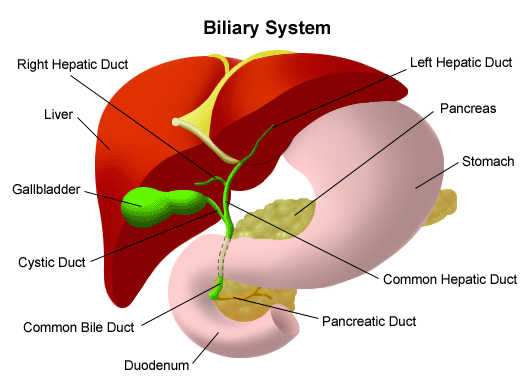The gallbladder is a muscular storage bag for bile, roughly the size of a small pear. It is attached to your liver, and is on the right side of your tummy, just behind your lower ribs.
Bile is continuously produced by the liver, and it travels down the bile duct into the duodenum. Bile mixes with food and is necessary for normal digestion. It is also stored in the gallbladder. Here it is concentrated and becomes thick. When you eat, your gallbladder squeezes the concentrated bile into your bile duct. This is why the pain from gallstones tends to occur after a meal.
Simply having gallstones is not a reason to have an operation, because most people will never have problems from their gallstones.
Gallstone symptoms include:
- Biliary colic: is pain in the upper part of your abdomen, which can last for minutes to hours, after eating fatty meals.
- Pain on the right side of your abdomen, lasting for 24hrs+ and feeling feverish
- Jaundice: where your skin goes yellow and your urine goes dark and your bowel motions are pale. This occurs when a stone escapes from your gallbladder and gets stuck in your bile duct
- Acute pancreatitis: where you get a severe indigestion type pain in your abdomen, requiring admission to hospital
Your gallbladder has usually already stopped working long before it ends to be removed.
There are no dietary restrictions once your gallbladder has been removed.
Occasionally patients report that their bowels work more frequently, but this is seldom a problem.
There are many risk factors for developing gallstones. They are common:
- With increasing age
- If you are obese or have high cholesterol
- In women and
- Seem to run in families
The number and size of your gallstones has no relationship to the amount of pain you may feel.
Gallstones also return within a few months of stopping the medication.
Shattering gallstones with ultrasound waves has been attempted. Unfortunately, the fragments either join back together or pass into the bile duct causing jaundice or pancreatitis.
If only the stones are removed, your gallbladder will make more, and you will have the same trouble all over again. It is therefore pointless to remove only the stones.
- Removing your gallbladder is called a cholecystectomy.
- You will have a general anaesthetic.
- The surgeon will make 4 small cuts on your abdomen, and “ports” are placed
- A Laparoscope and other long thin instruments are then put into your abdomen, via the ports.
- Your surgeon cuts it free of its attachments to the liver and protects your bile ducts.
- Your surgeon may take an x-ray of the bile duct during the operation.
To be eligible for your Cholecystectomy as a day case, you must be fit and healthy, and have a responsible adult to stay with you for 24hrs. If you have small children you will need to have a second responsible adult to look after them.
Yes. You need to keep to a very low fat diet. Avoiding butter, full fat milk, cream, cheese, chocolate etc. You should avoid any oily foods, and grill, rather than fry, your food.
Keeping strictly to this sort of diet usually means you will lose weight.
Your General Practitioner may already have given you a supply of strong painkillers to have in reserve should you have another attack of pain. If not, you can ask him/her for some painkillers.
This occurs in about 1 in 100 gallbladder operations and is usually diagnosed in the first few days following surgery. This is treated a further keyhole operation through the same scars to inspect the inside of your abdomen, and wash out the bile.
This may occur as a result of the ports being placed or from your bowel being scarred from previous surgery. This is usually seen at the time of surgery and repaired.
This is a serious but rare complication, occurring in around 1 in 500 Cholecystectomies. The damage may be identified at the time of the operation, and repaired. This requires an open operation to repair. However, it may not show up until a few days, or months after your procedure.
Small gallstones may pass in to your main bile duct while your gallbladder is being removed. If they get stuck in your bile duct you may become jaundiced, or experience biliary pain again. This occurs in around 1 in 100 Cholecystectomies. This can occur any time after your operation.
Gallstones are very common, and you can have them at the same time as a variety of other conditions that cause similar symptoms. So there is always a small chance that removing your gallbladder will not solve your pain.
If we feel that your symptoms are possibly not due to gallstones, we will warn you of this before we remove your gallbladder. We may order further investigations.
As a general rule, we don’t recommend surgery to prevent trouble from gallstones. This is because many people have gallstones and live their entire lives without having symptoms.
You may wish to discuss your own particular situation with a specialist.
No, there are no restrictions. For the first few days after your operation, you may not have much appetite. We recommend that you have smaller meals until you feel your appetite has fully recovered.


